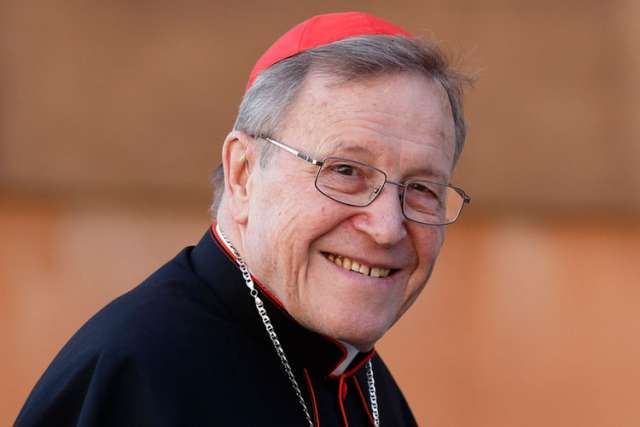"I had the impression the pope is open for a responsible, limited opening of the situation, but he wants a great majority of the bishops behind himself. He does not like division within the church and the collegiality of bishops," German Cardinal Walter Kasper, speaking English, told Catholic News Service Oct. 1. "I have the impression the pope is ready to reaffirm such a thing, but now it depends also on the voices of the bishops in the synod."
By church law, divorced and civilly remarried Catholics are not admitted to Communion unless they obtain an annulment of their first, sacramental marriages or abstain from sexual relations with their new partners, living together as "brother and sister."
Pope Francis has said the predicament of such Catholics exemplifies a general need for mercy in the church today. He invited Cardinal Kasper to address the world's cardinals at the Vatican in February, when the cardinal argued that, in certain cases, the church can "tolerate something that, in itself, is unacceptable": a couple living together as husband and wife in a second union.
"I spoke beforehand with the pope himself; otherwise I would not have touched this problem in my conference. The pope encouraged me as a question," the cardinal said.
That question is sure to be one of the most discussed at the Oct. 5-19 extraordinary Synod of Bishops on the family, which will prepare the agenda for a larger world synod in October 2015. The later gathering will make recommendations to the pope, who will make the final decision on any change.
Already, Cardinal Kasper's proposal has provoked a lively debate at the highest levels. Four cardinals who will take part in the 2014 synod -- including the Vatican's doctrinal and finance chiefs and the head of its highest court -- have recently published essays arguing against the cardinal's proposal.
Critics commonly point to the several scriptural prohibitions of second marriages, especially Jesus' words in Matthew 19:9: "Whoever divorces his wife (unless the marriage is unlawful) and marries another commits adultery."
Cardinal Kasper says condemning second unions on that basis reflects a "fundamentalistic" reading of the Bible.
"We have to integrate such a word, one word of Jesus Christ, in the whole context of his message. We cannot take only one phrase and suddenly make all the consequences. We have to integrate it in the whole message of love, and of mercy, of forgiveness, of a new chance," he said.
The cardinal says describing second unions as adulterous is especially insensitive in a pastoral context.
"If you tell people who live in this way and they do it in a responsible way, tell them that adultery, permanent adultery, I think they would feel insulted and offended. We must be very careful also in our language," he said. "Permanent adultery? It seems to me too strong."
Cardinal Kasper said some second unions, while not equivalent to a sacramental marriage, possess some of the "essential elements of marriage and of a family: there is love, there is commitment, there is exclusivity, there is forever, there is prayer life, there are children, they're well-educated in Christian life. Many things are there and especially there is a public dimension."
While expressing his "high esteem" for those who abstain from sexual relations under such circumstances, the cardinal says he questions "whether this can be the path for everybody, especially if you are younger people, because such a marriage, also if it is a civil marriage, has its inner dynamics and whether we can focus only on this point of sexual relations, that's the question I have. We can say, we can advise people to do so, but to impose (abstinence), I have my questions about this point."
Under the right circumstances, he said, the church might not merely tolerate sexual relations in an "irregular" union but even consider them good:
"Such a sexual relation within such a couple has also its positive values; it's not only its negative values, and I think the first word of the church always, in every situation, is a 'yes.' 'I'm happy that God gives you this love and that you can express this love.' It's not the fullness already, but who of us loves God and loves the neighbor as he should do it? We are all on the way."
Cardinal Kasper rejects the arguments of some critics, such as Cardinal Carlo Caffarra of Bologna, Italy, that justifying non-marital sexual relations under these circumstances would weaken other church teachings on sexuality, such as the categorical prohibition of homosexual acts.
"Same sex is a different thing, and therefore you cannot come from one to the other," he said. "It's not a marriage for our understanding; it's not a family."
The church must respect same-sex couples and never discriminate against them, Cardinal Kasper said, but may not teach that such relationships are according to the "design of God" or appropriate for raising children, since every "child has a right to have a mother and to have a father for the health of their own development."
The cardinal also stresses that his proposal is intended for a small number of people, serious Catholics who would be admitted to Communion only after following a "penitential path" for the failure of their sacramental marriages.
That path is the lot of both spouses in a failed marriage, he says, regardless of their relative degrees of responsibility for the breakup: "I think totally innocent is nobody. Perhaps the first partner has abandoned his wife, but perhaps there is also some guilt on her side. It's difficult to judge here."


